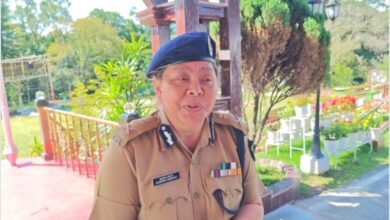District administration mulls random Covid testing

Shillong, July 29: Random testing will be carried out to detect silent carriers of Covid virus to contain the spread of the Covid-19.
The East Khasi Hills district administration decided this at a meeting of the District Task Force on Covid-19 and vaccination held at the DC’s office in view of the urgency due to the rising number of Covid cases in the district.
Micro analyses of the area-wise distribution of cases, number of deaths and vaccination coverage were done during the meeting.
Till date, 57% of the cases are from the urban areas while 43% are from the rural segment.
After chairing the meeting, Deputy Commissioner Isawanda Laloo said that most cases in the district are reported from select clusters.
Hence it was decided that localities or villages with more than 10 cases require special attention and would undergo intensive active surveillance and random testing to detect silent carriers, said the deputy commissioner.
Macro containment zones would be declared in areas showing a worrying trend of cases and deaths in order to carry out effective surveillance and prevent more deaths.
Strict enforcement of locality wise containment and rigorous testing in that area will be carried out.
In view of high transmissibility of the disease, it is required to encourage institutional isolation of positive cases in cases where home isolation is not feasible, the deputy commissioner said.
Both Corona Care Centres and Community Corona Care Centres (CCCs) are available in the urban and rural areas.
In cases where the number of family members is high or there is not enough space for home isolation, institutional isolation will be mandatory.
Persons who display mild symptoms / category B patients would also be asked to go to the CCCs for better monitoring of their health conditions.
There is a stress on the need to ensure timely treatment by early presentation to hospitals after the onset of symptoms.
For this, people should be encouraged to inform if they have symptoms, and not have any fear or misconception about the disease, she said.
Active awareness and steps will be formulated to do away with the stigma attached to the disease especially in rural areas.
The emphasis was on urgent vaccination as the only way to stop the cycle of infection, and pave the way to normalcy especially for livelihoods and education, which have been badly affected.





